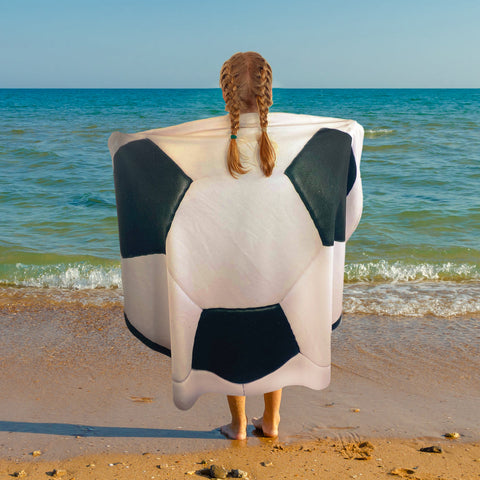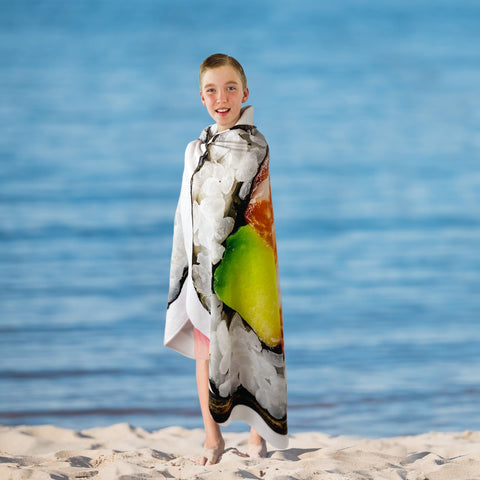Everything You Need to Know About Beach Towels
We grab them on the way to the beach, use them at the hotel pool, and even sprawl on them to sunbathe in the yard. Like most people, you’ve probably never given beach towels a second thought, unless you forgot to bring one with you.
Beach towels are actually quite versatile and different from your regular bath towels. From materials used to size and dimensions, bath towels are more than an average piece of fabric.
Get ready to learn everything you need to know about beach towels!
Types of Towels
Though it’s easy to consider all towels as interchangeable rectangles of absorbent material, there are several types available with unique applications. Technically, you can use a bath towel at the beach and a beach towel after a shower, but a hand towel isn’t going to cut it for either situation.
Hand Towels
As the name suggests, these towels dry your hands and face. They come in unique styles and colors but tend to be smaller, between 15 and 18 inches wide and 25 to 30 inches long.
Older hand towels are excellent for cleaning because they are the ideal size and super absorbent.
Bath Towels
Bath towels tend to be large and thick for people to use after a shower or bath. You can wrap them around your body to dry off. Sizes vary depending on the manufacturer and your preference but expect them to be at least 30 inches wide and up to 70 inches long.
These towels tend to be simple, solid colors with the occasional stripe or pattern. Bath towels may be crafted from a variety of fabrics, such as cotton terry cloth, bamboo fiber, and microfiber.
Beach Towels
Beach towels are lightweight and absorbent, making them ideal for sunbathing and swimming. They dry fast and typically come in bright colors and patterns.
Since they come in many colors and designs, you can use these novelty towels to express your style, interests, and personality. You can find many themed options, like sports teams, cartoon characters, and pop culture references.

Materials Used for Beach Towels
One of the key differences between beach towels and bath towels is the fabric. You can find bath towels in several materials, but beach towels are usually cotton or microfiber.
Since you usually use beach towels on the go, you want them to dry fast and not weigh you down. Cotton and microfiber are the best options because they are breathable and extremely absorbent.
Though cotton is a natural fiber that might be preferable for some people, synthetic microfiber towels last longer and dry a bit faster.
You can still use bath towels at the beach, but they tend to be thicker and heavier to endure frequent use and washings. Bath towels come in various materials that may not be ideal for use at the beach or pool because the sun, sand, and chlorine could impact their durability.
Size and Dimensions
Another key difference between beach towels and bath towels is size.
Beach towel sizes and shapes can vary by manufacturer. The rectangular towels generally range from 28 to 34 inches wide and 54 to 64 inches long. You can also find large, round beach towels with diameters ranging from 54 inches up to 70 inches.
Bath towels come in a range of sizes depending on their intended use. Towels intended to dry off the body typically range in size from 20 to 34 inches wide and 40 to 70 inches long.
You can also find bath towel sets with a range of sizes and purposes, including:
- Hand towels
- Washcloths that are typically 13 inches by 13 inches
- Face cloths that are 12 inches by 12 inches
- Bath mats range from 20 to 24 inches wide and up to 36 inches long.
While these all technically fall under the bath towel category, they aren’t interchangeable with beach towels due to their sizes. After all, you aren’t likely to sunbathe on a washcloth!
Uses and Applications
Beach towels make any beach or pool day better. They fit neatly in your bag or rolled up in the trunk until you need them. You can use them to lay out in the sun, protect against sand and other debris, and dry off after swimming. They also work well for picnics and as makeshift tents for camping on the beach.
Bath towels work best in your bathroom where they deliver unparalleled comfort and absorbency after a shower or bath. You can wrap up wet hair, use them at the gym, and relegate old, worn bath towels to your cleaning supplies.
Again, you can technically use beach towels and bath towels interchangeably, but there are some key reasons to keep them separate. While both offer excellent absorbency, beach towels tend to dry faster because they are lighter and thinner, while beach towels were made to last.

How To Wash Beach Towels
Proper care is essential for preserving your beach towel. They weren’t made for daily use or frequent washings like bath towels.
- Pre-Wash Preparation
- Washing the Towels
- Drying the Towels
Taking care at each step can extend your beach towel’s life for more trips.
Pre-Wash Preparation
Start by shaking out any lingering debris from the beach, like sand or dirt. It’s best to do this outside where you have plenty of room.
Look over the towel for any spots that could leave stains. It’s best to address any spots immediately with a stain remover or a little detergent.
If you have pockets in your towel, be sure to check for anything stored there. Leaving shells or rocks in the pockets could damage the towel. Coins and other debris can be noisy and leave spots.
Washing the Towels
It’s always best to follow the manufacturer’s directions, however, there are some general guidelines to keep your beach towel in tip-top shape.
Make sure you wash your towel with similar colors and select a gentle cycle, even if they are heavily soiled. Extra-grimy towels might need some heavy-duty washer action, but it can reduce their longevity. It’s better to spot clean, rinse, and then use a gentle cycle with mild detergent.
Use enough detergent to clean the beach towels because their absorbent nature usually requires a little extra. Don’t overdo it with the soap, but you don’t want to have to wash the load multiple times.
You also might be tempted to use fabric softener to improve the end result, but it could damage the fibers. Be sure to avoid using bleach as well.
Drying The Towels
If it’s nice out, you might want to hang your towels outside for that fresh scent. However, it’s more common to hang them up inside or lay them flat to dry.
Line-drying your beach towels is preferable because it preserves the fibers longer. You’ll also notice the color lasts longer because heat from the dryer can make the vibrant colors fade faster.
Hanging beach towels isn’t always an option, and that’s okay! Throw your towel in the dryer on a low heat setting for a shorter cycle. Check regularly because they dry fast and you don’t want to leave them in the heat for too long. Over-drying beach towels can cause shrinkage, impact absorbency, and cause wrinkles.
After washing, tumble dry on low heat or air dry flat. To avoid fading and fraying, store beach towels away from direct sunlight when not in use.
FAQs About Beach Towels
Do you still have questions about beach towels? These frequently asked questions should clarify things for you.
Beach towels are lightweight and highly absorbent towels. They come in a range of sizes and shapes with several patterns and designs to show off a person’s interests and style at the pool or beach.
Since beach towels are either natural cotton or synthetic microfiber, they dry exceptionally fast and travel well. It’s easy to dry off after swimming or brush off the sand from the beach.
Modern beach towels even come with special features, like fabric that offers UPF protection from the sun. Other beach towels leverage antimicrobial technology to resist bacteria growth. These unique features set beach towels apart from other towel types, making them ideal for outdoor use.
Yes, you can technically use a bath towel for the pool. However, if you’ve ever had the misfortune of forgetting your beach towel, you know a bath towel isn’t the best substitute for several reasons.
First, bath towels are extremely thick, which is excellent for absorbing moisture after a shower. At the pool, bath towels become saturated too quickly and don’t dry fast enough to make it worthwhile.
Beach and pool towels were specifically created to dry fast and use lighter-weight materials to accomplish that feat. A bath towel will likely still be soaking wet when you go to leave. It also means you need a backup towel if you want to jump in the pool more than once.
Further, bath towels holding in that much moisture stand a greater chance of growing bacteria that can be harmful to you in the long run.
Beach towels are generally larger and thinner than shower towels, which are more like bath towels. They tend to be made of materials that can withstand heat, sun, and sand better than shower towels. Beach towels are also easier to pack and take to the beach, camping, or poolside.
Plus, you can find beach towels in various patterns, designs, and color schemes that show off your personal style.
Shower towels were designed for daily use and to endure more frequent washings. They tend to have solid colors with minimal decor or personality.
A bath towel is a soft, absorbent cloth intended to dry the body after a shower or bath. It’s larger, thicker, and denser than pool towels to accommodate daily use and different body types. They take a longer time to dry because of the dense materials.
Pool towels might be longer or wider than bath towels, but they are usually much thinner. Since pool towels frequently come in contact with chlorinated water, they need to be a little more durable.
Manufacturers typically use quick-drying fabrics like terrycloth or microfiber that are lightweight but treated to handle the chlorine without fading or fraying.
Final Thoughts
Beach towels are fundamental to any day at the beach or pool. They are lightweight, stylish, and versatile enough to support many outdoor adventures.
While it could be tempting to grab a regular bath towel, you will regret not using a beach towel. The lighter, thinner towels dry faster than the thick bath towels and make your entire experience better.
Knowing the best uses for beach towels and bath towels can help you choose the right one for your needs at any given time.
Don’t forget to properly care for your beach towel to ensure it lasts a long time!
